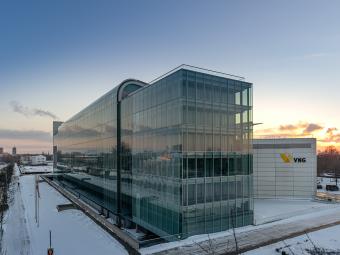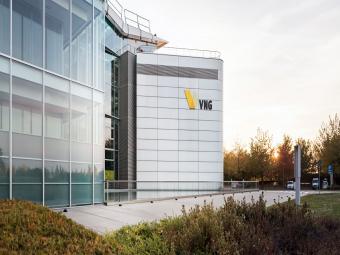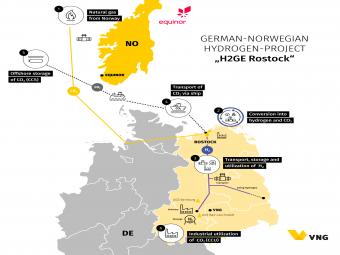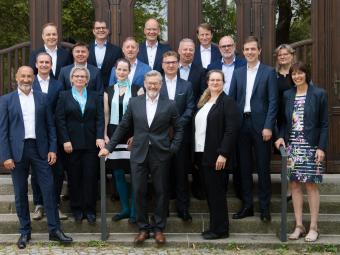VNG submits application for stabilisation measures under section 29 of the Energy Security of Supply Act
VNG AG has today submitted an application to the German Federal Ministry for Economic Affairs and Climate Action (BMWK) for stabilisation measures under section 29 of the Energy Security of Supply Act.
Due to unfulfilled supply obligations by upstream suppliers, it has been and continues to be necessary to procure gas quantities at considerably higher prices on the energy markets in order to maintain the ability to reliably supply VNG customers at contractually agreed significantly lower prices. To avert further losses for VNG and to enable the VNG Group’s business operations as a whole to continue, VNG sees itself compelled to apply for further supporting measures under the Energy Security of Supply Act in addition to the ‘gas surcharge’ (under section 26 of the Act) that has already been applied for.
Until the start of the Russian war of aggression, VNG was a healthy corporate group contributing to the security of supply of gas in Germany through its four business areas of Trading & Sales, Transport, Storage and Biogas and also to shaping the energy transition with its future-oriented activities in the area of green gases with biogas and hydrogen. The impacts of the Russian war on the energy markets placed VNG in an increasingly critical financial situation through no fault of its own.
This is because of the necessity of replacement procurement on the open market. Gas quantities affected by Russian supply disruptions, in some cases at agreed fixed prices, now have to be procured at massively higher prices due to the war. VNG needs these replacement quantities to continue reliably supplying its customers on the originally agreed terms and in this way to shield customers from the impacts of the war.
VNG has two contracts that are affected by the Russian supply disruptions. There is a direct contract for approximately 35 TWh of gas per year with Gazprom Export, which is currently not being fulfilled and is not expected to be fulfilled for the foreseeable future. This contract expires at the end of the year. As a direct importer, VNG would be able, by its own means and together with further stabilisation measures from its shareholders, to bear the losses that even with the relief expected from 1 October 2022 as a result of the gas surcharge will amount to approximately €1 billion in 2022.
The larger of these two contracts relates to gas purchases of approximately 65 TWh per year with a German upstream supplier that imports the corresponding gas quantities. This contract has not been consistently fulfilled since mid-May. In August, contrary to expectations, VNG had to meet most of the cost of replacement procurement when gas prices were at an all-time high. With support from the German government, ways have been sought in recent weeks to reach a final settlement. However, this does not appear achievable in the near future in a form that is economically viable for VNG. The resulting financial burden would be unsustainable for VNG.
VNG’s ability to continue operating is therefore now to be safeguarded with the stabilisation measures applied for under section 29 of the Energy Security of Supply Act. This step is necessary despite the financial support measures taken so far by VNG and its shareholders, in order to reduce the incurred and anticipated losses to a level that can be borne by VNG and its shareholders and consequently to safeguard the proper functioning of the gas trading market and security of supply.
In parallel with the application now submitted, the ongoing talks on options for the company’s further stabilisation continue with the German government, majority owner EnBW and other municipal shareholders.
Today’s application under section 29 of the Energy Security of Supply Act is necessary to safeguard VNG Group’s ability to continue operating as Germany’s third largest gas supplier and as a system-relevant provider for the secure supply of approximately 400 municipal utilities and industrial customers, Germany’s second largest transmission system operator (ONTRAS Gastransport GmbH) with 7,700 kilometres of gas grid, Germany’s third largest storage operator (with 2.2 billion cubic metres of storage volume) and the second largest German biogas plant operator with 38 biogas plants in eastern and northern Germany (157 MW rated thermal input). In addition, under its VNG 2030+ strategy, VNG remains committed to helping shape the energy transition together with the transition from natural gas to green gases, as well as to its growth path in biogas and activities to ramp up a green hydrogen economy.

VNG is a group of over 20 companies active in the European energy industry with around 1,900 employees. Headquartered in Leipzig, the group is a gas importer and wholesaler as well as an operator of critical gas infrastructure in the areas of natural gas transport and storage, ensuring a secure energy supply in Germany. With our commitment, projects and investments for the market ramp-up of renewable and decarbonised gases such as biogas and hydrogen, we are also creating new perspectives, actively driving change in the energy sector and strengthening our home region. Dependable, approachable and always moving. VNG – Energy. On the move.





